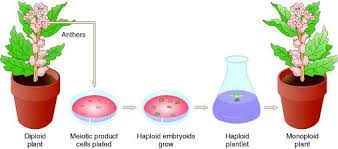Organisms with one chromosome set sometimes arise as variants of diploids; such variants are called monoploids (1x). In some plants like the ferns, monoploid stages are part of the regular life cycle, but other monoploids are spontaneous aberrations. The haploid number (n), which we have been using in your study of genetics refers strictly to the number of chromosomes in gametes.
Occurrence of Monoploids
In the plant kingdom, spontaneous monoploids have been found in tomatoes and onion and more recently in coffee, barley, coconut and wheat among other plants
Production of Monoploids
Inter specific and Intergeneric Hybridization
Jorgensen (1928) performed the corss Solanumnigrumx S.luteumand the offspong were S. nigrum haploids. Here the embryos developed directly from the egg without fertilization parthenogenesis).
Irradiation and Chemical Treatment
Normal plant are pollinated with gamma-irradiated pollen making them to lose their viability to fertilize.
Read Also : Worm Infestation on Ruminant Animals: Symptoms and Treatment
The unferlized egg is stimulated to develop parthenogenetically. Pollen can also be treated with chemicals such as tohidine blue to achieve similar effect.
Twin Seedling
Twin seedling result from polyembryonic seed. Polyembryonic seed can produce diploid-diploid, diploid-haploid or haploid-haploid twins. Twin seedling is controlled by the female genotype.
Anther and Pollen Culture
Pioneering work in Daturainnoxia showed that culturing anthers can yield haploid plants either by the direct format of embryo-like structures from pollen grains or by the formation of callus and subsequent plant regeneration.
Chromosome Elimination
Kasha and Kao (1970) crossed cultivated barley, Hordeum vulgare (2 x = 14) with its wild relative H. bulbosum (2x = 14) to give a hybrid. Subsequent mitotic elimination of the H. bulbosum chromosomes in the developing embryo gave a haploid.

Meiotic Behaviour in Monoploids
In order to have normal meiosis, there must be two homologous chromosomes present. Monoploids have only one basic genome (x) and are therefore meiotically irregular. The chromosomes appear mostly as univalents at diakinesis.
Read Also : How to Identify and Treat Poisoned Animals
However, bivalents and multivalent were occasionally observed (intragonic pairing = pairing of chromosome in monohaploids).
The pairing mechanism in monohaploids is not yet clear. Rieger (1957) put forward a theory that all chromosomes have certain tendency for pairing. If homologous chromosomes are present, they are prefentially paired.
If absent, certain forces unite nonhomologous chromosomes. This agrees with precocity theory of Darlington (1932) that single chromosomes are in an unsaturated state electrostatically, and in order to become saturated, they must pair. Precocity theory is weakened by the fact th at chromosoma had been duplicated at the S phase.
Fertility in Monoploids

The germ cells of a monoploid cannot proceed through meiosis normally, because the chromosomes have no pairing partners. Thus, monoploids are characteristically sterile. (Male bees, wasps, and ants bypass meiosis in forming gametes; here, mitosis produces the gametes).
If a monoploid cell does undergo meiosis, the single chromosomes segregate randomly, and the probability of all chromosomes going to one pole is (1/2)x-1, where x is the number of chromosomes. This formula estimates the frequency of viable (whole-set) gametes, which is a small number if x is large.
In summary, some organisms occur naturally as monoploids although artificial monoploids can be created through various techniques. A monoploid is an organism with a haploid set of chromosomes. The method for their production include interspecific and intergeneric hybridization, anther and pollen culture, and twin seedling and chromosome elimination.
Read Also : The Major Effects of Water Pollution
Frequently Asked Questions
We will update this section soon.

